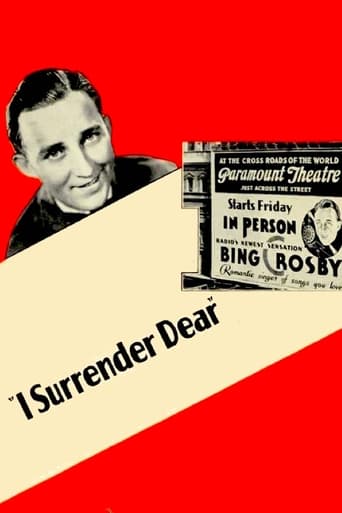mark.waltz
Bing Crosby was the first of the Megastar, and has already been on radio and in recording studios to his entry into films as part of Paul Whiteman's band. his foray into films began as a crooner in early musical reviews, and with shorts in the 1930s, he proved he was ready to make the move into feature film stardom. Under the healm of the legendary Mack Sennett, he was given the opportunity to learn a light comedy skill which intertwined well with his crooning and ability to woo his leading lady.While certainly not much to look at, he certainly had a way with a song, And like Broadway hoofer Fred Astaire, could attract the most beautiful of women with a light- hearted way about him. this farce has Crosby playing himself, mistaking another young woman for his sister and going toe-to-toe with the European aristocrat she is involved with. It's obvious who she'll choose, and after two songs, Crosby has won over the audience as well. Crosby would go onto several decades of film stardom, so it's interesting to revisit these early films that document his rise.
MartinHafer
In Bing Crosby's earliest films, he appeared in some shorts directed by Mack Sennett--the same guy who practically invented slapstick during the early days of silent comedies. So, it's not surprising that in addition to the singing, there is a bit of comedy in these shorts. In the case of "I Surrender Dear", the joke (snuch as it is) is that Bing can't convince people he IS Bing Crosby. In two cases, they actually think he's a masher and all sorts of complications ensue. Unfortunately, none of this is particularly funny though Crosby seems to try his best. In addition, you get to hear Bing sing his bit hit "I Surrender Dear" and it's actually the best part of the film. Interesting for Crosby fans to see what this future star was like in his early days, otherwise pretty easy to skip.
bkoganbing
This Mack Sennett short starring Bing Crosby has Bing with his friend Arthur Stone on the way to the train to meet his sister. He doesn't meet his sister, but he does meet the girl of his dreams in Marion Sayers. Not that she's not willing to get involved with the hottest new radio singer around, but Marion's got a mother in Julia Griffith and a fiancé in Luis Alberni.There's no real plot to this short subject other than Bing Crosby trying to convince Sayers that he is Bing Crosby and trying to avoid the hot tempered Alberni who carries a sword cane for protection and to defend his honor which gets repeatedly slighted. As it is in Mack Sennett shorts a sword cane is no match for a good swift kick in the posterior.The title song of the short I Surrender Dear was the song that gained Bing Crosby his first radio show. Bing left the Gus Arnheim Orchestra and his Rhythm Boys partners and went out as a solo artist in 1930. He recorded I Surrender Dear and William Paley heard it while on a sea voyage. He couldn't get the singer out of his mind so when he reached land he gave out orders to sign that singer. As a result Crosby got his first radio show, a 15 minute evening broadcast on CBS radio for Cremo Cigars. Your hearing the song that made him a star in this short.I Surrender Dear was written by Bing's Rhythm Boy partner Harry Barris and Gordon Clifford. Barris also contributed another song in this short At Your Command with words by Harry Tobias. Both of those early records are considered classics by Crosby collectors. The third song in this short is Out Of Nowhere by Johnny Green and Edward Heyman. It happens to be the first of two songs that Bing sang on that original first broadcast for CBS. It too is a Crosby classic.I Surrender Dear, the record and the short, are a real treat for Crosby fans of all ages.


